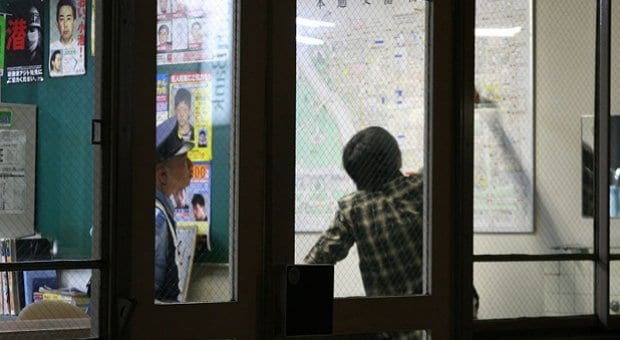A funny thing happened as I was walking down one of the main shopping streets in Tokyo. Like many travellers dazzled by the sights, sounds and the bustling city’s lights, I found myself disoriented as to where I was and where I needed to go. Little did I realize that in the next couple of minutes I would commit a crime that would see me detained for three hours in a Japanese police station.
My crime was to accept assistance from a police officer by asking for directions. Well, it wasn’t actually asking for directions that landed me in hot water, but it was the catalyst that would send me on a journey, which included interrogation, a strip search, being lost in translation and a lesson in penmanship. The police officer, in his role of protecting the Japanese public and promoting tourism in his nation, was fulfilling his duty to verify identity and ensure that the country is free of illegal aliens.
I, like most travellers, once I have cleared immigration and customs, usually lock up my passport in the hotel safe or leave it on board my cruise ship, as my passport is one of my most valuable possessions when I’m travelling. To lose or have your passport stolen is a nightmare. It effectively clips your wings and prevents you leaving the country. To get a replacement passport can take days or weeks, depending on where you are. In Japan, however, visitors are required by law to carry a passport (or, for foreign nationals living in Japan, an alien registration card) at all times. It is your responsibility to know this law, as it is not documented on the landing cards for Japan, nor is there signage or communication about the law at customs and immigration upon arrival. You just have to know.
A consular advisor at the Canadian embassy in Tokyo says, “It is a rare but not uncommon occurrence for foreigners residing in or visiting Japan [to be asked for identity documentation and to be detained when it’s not provided]. From previous experience, the best course of action in this situation is to be cooperative and to give the police no grounds to prolong their check. If a person resists, is confrontational or refuses to cooperate, the individual may find themselves at a police station for several hours or a couple of days. Police can detain people for up to three days ‘on suspicion,’ and we have had several reports of Canadians detained simply because they refused to present their identity documents and resisted the police. Regulations concerning non-nationals are sovereign rights-of-states; as such, Japanese police officers are authorized to ask foreigners to produce their passport or proof of residency in Japan as part of their responsibility to protect Japan’s safety and to enforce Japan’s immigration laws.”
Is Japan an isolated incident or is this more common than I had thought? As it turns out, according to a spokesperson from Canada’s Department of Foreign Affairs, “There are a certain number of countries that require foreign nationals to carry either their passport (original or photocopy, in accordance of the local laws) or an identification issued by the local authorities in case the said foreign nationals reside in the country. Examples of such countries are France, Germany, Belgium and Thailand. If that is the case, Department of Foreign Affairs’ Travel Advisory indicates so in its ‘Laws & Culture’ section [found within each country’s Travel Advice and Advisories section] on travel.gc.ca. We would also suggest people register with Registration of Canadians Abroad (ROCA). It is a free service offered by Foreign Affairs that keeps Canadian travellers connected to Canada in case of an emergency abroad, such as an earthquake or civil unrest, or an emergency at home.”
So as you plan your sun, beach or mountain escapes this fall and winter, make sure you take the extra time to visit travel.gc.ca and review your destination’s “Laws & Culture” section so you can skip an unwanted visit to a prison cell and a behind-the-scenes tour of a foreign police station. Though the experience of spending three hours with the police — waiting for my passport to arrive at the station, being interrogated by five different officers and having to write a letter of apology to the Government of Japan, promising to always carry my passport while in Japan — was interesting and makes for a good story, it is not something I would recommend.
Dean Nelson is the executive producer of GayWhistler’s WinterPride and a freelance travel writer.

 Why you can trust Xtra
Why you can trust Xtra